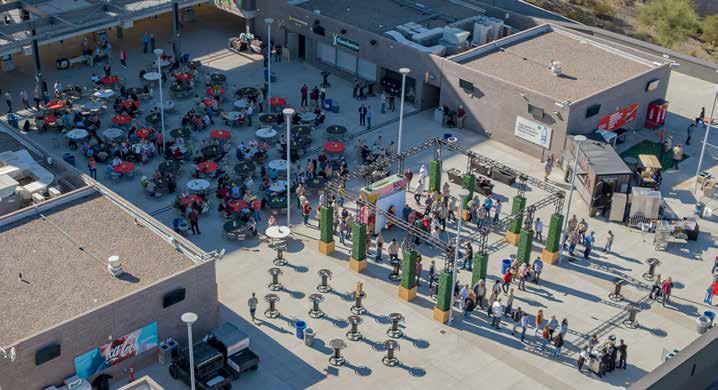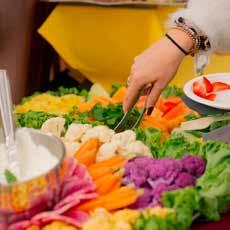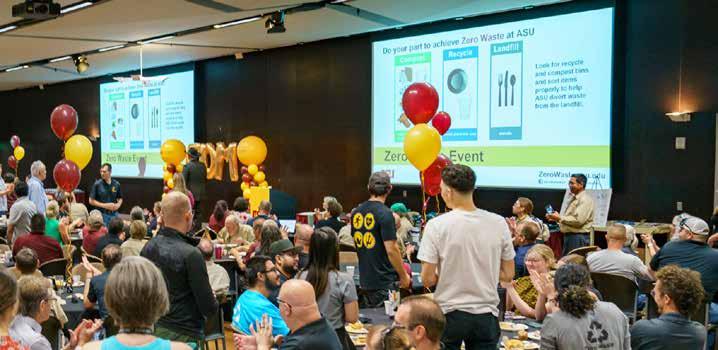Sustainable Event Planning Handbook



Arizona State University is a globally recognized leader in sustainability across higher education. This handbook provides the ASU community with tips and resources to help apply ASU’s sustainability goals when planning events.
Integrating sustainability into event planning does the following:
▪ Advances ASU’s institutional sustainability goals.
▪ Demonstrates good stewardship of public funds.
▪ Enhances brand reputation through visible values-driven practices.
▪ Focuses on the core purpose of events, not excess or material display.
▪ Improves operational efficiency and streamlining logistics.
▪ Partners with vendors who share ASU’s values and quality.
▪ Realizes long-term cost savings through smart, upfront choices.
▪ Reduces environmental impact and conserves valuable resources.
Does the venue or space have notable sustainability features? These can include:
▪ Accessible by campus shuttles or low-carbon methods of transit.
▪ Digital signage
▪ Energy efficiency practices
▪ Local or sustainably sourced food and beverages
▪ LEED certification — cfo.asu.edu/leed
▪ Natural elements
▪ Recycling and composting
▪ Reusable decor
▪ Water conservation practices
Tip: The Memorial Union and Student Pavilions across Valley campuses feature built-in sustainability measures, including default zero-waste catering with compostable plates, utensils and compost bins.
Nature-inspired spaces include the Garden Commons at Polytechnic: cfo.asu.edu/Garden-commons and the Secret Garden at Tempe.
Use caterers and food vendors dedicated to sustainable practices. Catering coordinators can help plan a menu that meets zero-waste goals.
Choose catering companies that offer sustainable characteristics, including:
▪ Adheres to ethical sourcing practices.
▪ Donates leftover food.
▪ Enforces an environmental policy or sustainability statement.
▪ Offers vegan or vegetarian options.
▪ Provides organic options.
▪ Sources ingredients locally.
ASU Sun Devil Hospitality catering coordinators address event-specific sustainability needs, such as local Sonoran foods, zero waste and plant-forward options: sundevilhospitality.asu.edu/sustainability/our-people-and-planet-commitments
Plant-forward and locally sourced menus with seasonal ingredients
When possible:
▪ Ask caterers to develop seasonal menus using traditional Sonoran ingredients.
▪ Choose caterers with farm-to-table practices and who offer plant-forward menus. This supports local farmers and saves emissions by reducing transportation.
▪ Reduce the carbon footprint of your protein by offering plant-forward menu options.
Purchasing any of these?
▪ Coffee and tea
▪ Dairy products
▪ Eggs
▪ Meat
▪ Meat alternatives
▪ Produce

Seafood
Reference the Sustainable Purchasing Guidelines for sustainability certifications and attributes for these purchasing categories: cfo.asu.edu/sustainable-purchasing
Helpful things to do:
▪ Confirm guest attendance and submit a final headcount to catering 72 hours before the event.
▪ Eliminate single-use plastics such as individually wrapped condiments by providing them in bulk containers.
▪ Offer buffet-style catering and refillable beverage stations instead of individual box lunches and plastic bottles.
▪ Prioritize reusable dishes, cutlery and cups by requesting them from the caterer.
▪ Use reusable linen tablecloths and napkins. If it is unfeasible, use recycled paper.
▪ Choose small, local businesses to support our communities’ economic strength.
▪ Purchase from local vendors to reduce transport miles and carbon emissions.
Use the Active Supplier Search tool in Workday to identify suppliers registered as small businesses: www.asu.edu/purchasing/pdf/active-supplier-search-guide.pdf
Purchase promotional products using the licensed vendor search to ensure products are sourced from vendors prioritizing fair labor practices: cfo.asu.edu/purchasing-sunmart-promo
Explore ASU’s Sustainable Purchasing webpage for guided buying tools, including:
▪ Sustainable shopping lists, preferred product sorting and eco-certifications.
▪ Sustainable Purchasing Guidelines for other event purchasing considerations: cfo.asu.edu/sustainable-purchasing
Examples of eco-certifications include:

▪ B-Corp • Fair Trade© • Rainforest Alliance Certified
The Zero Waste Vendor Agreement ensures vendors adhere to ASU best practices and policies regarding responsible waste management and prohibited items: cfo.asu.edu/plan-a-zero-waste-event
You can also ask vendors about their efforts to eliminate waste during production, use and disposal.
▪ Ensure disposable products are either recyclable or compostable.
▪ Request no-excess packaging when ordering event supplies. Avoid purchasing or using plastic foam.
▪ Select Frustration Free Packaging at checkout when ordering from Amazon.
Ask colleagues if they have materials to lend. You can also reduce waste by doing the following:
▪ Avoid decorations that are made of single-use materials, such as balloons.
▪ Use reusable name tags and lanyards that can be collected at the end of your event.
View the Fulton Engineering Events Inventory for a catalog of rentable event supplies and decor: events-inventory.engineering.asu.edu
Order from ASU’s licensed vendor catalog to prioritize sustainable products with better materials and reduced plastic: clc.com/license-search
You can also:
▪ Select promotional items that support sustainable lifestyle habits and are reusable.
▪ Shop from sustainable product lists in vendor catalogs.
Refer to the ASU Sustainable Promotional Products Material Toolkit to learn about best practices for giveaways and see examples of sustainable products: cfo.asu.edu/sustainable-purchasing
Choose digital signage to avoid physical waste.
Tip: If printed signage is necessary, use evergreen language for reuse. For example, use banners without dates or locations for annual events. Include details like the event name, month, contact info or a long-standing webpage link.

Brief event staff about the event’s sustainable attributes, including catering, waste and supplies. .
Ask staff to apply sustainable practices by doing things like:
▪ Collect attendee name tags.
▪ Identify water bottle refill stations for attendees.
▪ Locate waste receptacles and demonstrate proper disposal practices.
▪ Save event decorations and centerpieces.
Event staff and volunteers are your eyes and ears of the event. Ask for their feedback and suggestions about what sustainable efforts worked well and what could be improved.
Conduct a waste audit and identify improvements on what items went to waste.

Tell attendees how they can contribute to your event’s sustainability goals. For example, ask attendees to take part in sustainable behaviors like:
▪ Bring a reusable water bottle or utensils.
▪ Properly sort waste.
▪ Use low-emission transportation to and from the event.

Distribute marketing, event promotion and information electronically on social media, email newsletters or other online platforms, including ASU Events: asuevents.asu.edu
Use 100% post-consumer recycled Forest Stewardship Council-certified paper for any printed materials.
Tip: ASU Print Anywhere uses 100% post-consumer recycled FSC-certified paper: printanywhere.asu.edu
Submit the event to the Sustainability Recognition Program: cfo.asu.edu/sustainability-recognition-program
Thank attendees for engaging in sustainable behaviors and reinforcing their contribution to sustainable behaviors.
Tip: Send follow-up communications reinforcing positive behaviors — this can increase the likelihood of attendees practicing sustainability at future events.
This includes:
▪ Food waste — check if composting services are available at the venue.
▪ Single-use items.
▪ Vendor materials — i.e., soft plastic, cardboard, giveaway items.
Refer to the ASU waste directory to determine what is accepted: cfo.asu.edu/recycle
Tip: Use the Zero-Waste event checklists for the best sustainability practices based on the event’s location: cfo.asu.edu/plan-a-zero-waste-event
Take these actions to reduce the amount of waste your event generates:
▪ Announce how to properly dispose of waste at the start and end of the event.
▪ Delegate volunteers to monitor waste bin use.
Contact the Zero Waste department to borrow branded signage for bins needed labeling: cfo.asu.edu/zerowaste
Tip: Showing a presentation during the event? Provide a slide at the beginning and the end telling attendees how to identify and properly discard waste items specifically found at your event.

Active Supplier Search to find small businesses cfo.asu.edu/supplier-inclusion
ASU Catering sundevilhospitality.asu.edu/catering
ASU licensed vendor catalog clc.com/license-search
ASU Moving and Event Services cfo.asu.edu/moving-event-services
ASU Zero Waste zerowaste.asu.edu
Events registry eventreg.asu.edu
Follow University Sustainability Practices on LinkedIn www.linkedin.com/company/sustainability-practices-asu
Ira A. Fulton Schools of Engineering events inventory events-inventory.engineering.asu.edu
Plan a Zero Waste event cfo.asu.edu/plan-a-zero-waste-event
Subscribe to the Campus Sustainability newsletter cfo.asu.edu/personal-action
Sustainability goals and vision cfo.asu.edu/sustainability-goals-and-vision
Sustainable purchasing cfo.asu.edu/sustainable-purchasing
Sustainability Initiatives Revolving Fund cfo.asu.edu/sirf
Sustainability Recognition Program cfo.asu.edu/sustainability-recognition-program
Sustainability reports cfo.asu.edu/sustainability-reports
Trademark licensing program brandguide.asu.edu/brand-elements/trademarks-licensing/merchandise
Waste directory cfo.asu.edu/recycle
Zero Waste event vendor agreement cfo.asu.edu/plan-a-zero-waste-event
This handbook has been printed on FSC-certified paper.